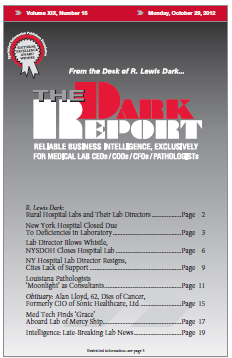CEO SUMMARY: Unable to overcome problems at a rural hospital laboratory caused by the parent hospital’s financial problems and the inability of the hospital to recruit adequate numbers of lab staff, the laboratory director terminated his agreement with the hospital and notified the New York State Department of Health about the situation. Alerted by this …
Lab Director Blows Whistle, NY Closes Hospital Lab Read More »
To access this post, you must purchase The Dark Report.


